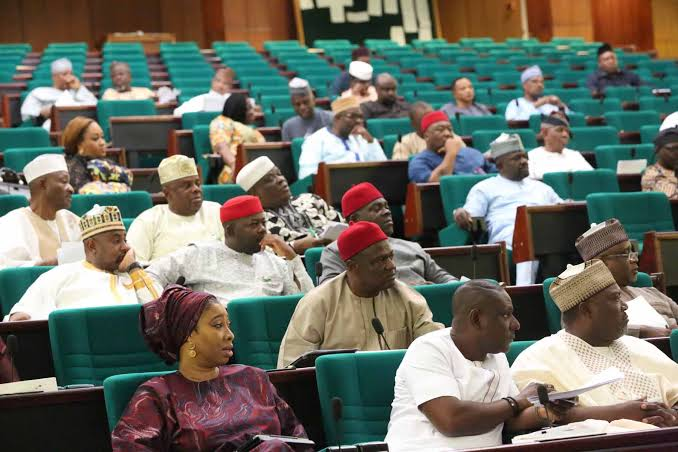LGAs : House of Reps Moves to Upgrade Lagos 37 LCDAs

Bill to Upgrade Lagos LCDAs to LGAs Passes Second Reading
The House of Representatives has advanced a bill seeking the Lagos LCDAs upgrade to LGAs, marking a significant step toward increasing the number of Local Government Areas (LGAs) in Nigeria.
The bill, which passed its second reading on Wednesday, aims to grant full LGA status to the 37 Local Council Development Areas (LCDAs) in Lagos State. If fully enacted, the total number of LGAs in Nigeria will rise from 774 to 811, making Lagos the state with the highest number of LGAs.
Details of the Lagos LCDAs Upgrade to LGAs Bill
The bill, sponsored by James Faleke, Babajimi Benson, Enitan Badru, and 19 other lawmakers, is titled:
“A Bill for an Act to Alter the Constitution of the Federal Republic of Nigeria, 1999 (as amended) to Accommodate the Thirty-Seven (37) Development Area Councils of Lagos State as Full-Fledged Local Government Areas, Increasing the Total Number of Local Government Areas in the Federation to Eight Hundred and Eleven (811), and for Related Matters (HB. 1498).”
Once passed into law, Lagos State will surpass Kano and Katsina, which currently have 44 and 34 LGAs, respectively, in terms of local government administration.
Why Lawmakers Support the Lagos LCDAs Upgrade to LGAs
The Lagos LCDAs upgrade to LGAs is a long-standing demand for improved grassroots governance. The 37 LCDAs were initially created by President Bola Tinubu in 2003 when he was the governor of Lagos State.
- House of Representatives Approves State of Emergency in Rivers State, Suspends Governor for 6 Months
- https://www.thecheernews.com/afenifere-slams-national-assembly-over-rivers-state-emergency-declaration/
Supporters of the bill argue that upgrading the LCDAs to full-fledged LGAs will:
- Bring governance closer to the people by decentralizing administrative power.
- Improve access to federal allocations for enhanced development.
- Enhance local representation and political participation in Lagos State.
Lagos State House of Assembly’s Position on the LCDAs
Meanwhile, the Lagos State House of Assembly has been considering a separate legislative proposal to restructure the 37 LCDAs into newly designated administrative areas. This move could potentially impact the implementation of the federal bill if it becomes law.
Implications of the Lagos LCDAs Upgrade to LGAs
If the bill becomes law, it could reshape Nigeria’s local government structure in the following ways:
- Increased federal funding for Lagos State, as each new LGA would be entitled to allocations.
- More local government autonomy, allowing for improved service delivery.
- A shift in political dynamics, with new opportunities for governance at the grassroots level.
What Happens Next?
With the bill passing its second reading, the next steps include:
- Committee review – The bill will be scrutinized by the relevant legislative committees.
- Public hearing – Stakeholders, including Lagos residents and political leaders, will have a say.
- Final voting and Senate approval – The bill must pass through all stages before becoming law.
Functions of Local Government Areas (LGAs) in Nigeria
Local Government Areas (LGAs) in Nigeria play a crucial role in grassroots governance and community development. Their functions are outlined in the Fourth Schedule of the 1999 Constitution of Nigeria, which grants them authority over several key areas.
- Provision of Basic Services – LGAs are responsible for the construction and maintenance of roads, markets, motor parks, and public conveniences within their jurisdiction. They also manage sanitation, waste disposal, and environmental health services.
- Primary Education and Healthcare – LGAs oversee primary school administration, including teacher employment and school infrastructure. They also manage primary healthcare centers, immunization programs, and disease control.
- Local Economic Development – LGAs support agriculture, trade, and local businesses by providing resources such as rural credit schemes and organizing local markets.
- Law and Order – They assist in maintaining security through collaboration with traditional rulers, vigilante groups, and community policing efforts.
- Collection of Taxes and Levies – LGAs generate revenue by collecting tenement rates, business permits, market tolls, and other local taxes.
- Rural Development and Infrastructure – They handle projects like rural electrification, water supply, and the establishment of recreational centers.
- Dispute Resolution and Social Welfare – They settle minor disputes through customary courts and support welfare programs for children, the elderly, and persons with disabilities.
- Public Transportation and Traffic Control – LGAs regulate public transport, assign bus routes, and enforce traffic laws to ensure order within their domain.
By performing these functions, LGAs bring government closer to the people, promote local participation in governance, and enhance community development across Nigeria.
Stay Updated on Lagos LCDAs Upgrade to LGAs
As developments unfold, we’ll bring you the latest updates on the Lagos LCDAs upgrade to LGAs and other legislative decisions shaping Nigeria’s governance.
#LagosLCDAs, #LocalGovernment, #NigerianPolitics, #HouseOfReps, #Governance, #LGAs, #GrassrootsDevelopment,





